September 2011 Newsletter
Posted on September 20, 2011.
Welcome to the September 2011 issue of the Global Washington newsletter. If you would like to contact us directly, please email us.
IN THIS ISSUE
Note from our Executive Director
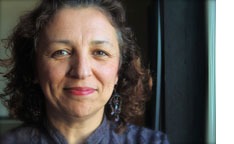
Greetings,
As Washington’s dynamic global development sector continues to grow, Global Washington urges you to join hands and celebrate the accomplishments, leadership and impact of our Global Development Sector’s work for the betterment of the world on November 1, 2011, 11.1.11, recognized as “Global Action Day” by the mayor of the City of Seattle.
Global Washington invites you to be a part of the movement on Global Action Day and explore the many opportunities to get involved through philanthropy, travel, volunteer opportunities and critical investment opportunities.
On the Global Action Day, join Global Washington and it’s 140 members to strengthen our global development sector and become a leader in making the world a more equitable, secure, prosperous, and sustainable place to live for all. We will be sending more information to you about the ways you can get involved with this day.
Global Action Day will take place on the second day of the conference. We hope that you have registered to attend our upcoming third annual conference: Opportunities and Obstacles in Turbulent Times. There are several ways that your organization can be a part of the conference:
- submit a proposal to present during a conference session on innovations
- become an exhibitor
- support the conference by becoming a sponsor
- attend and contribute to this growing community.
The annual conference is an important milestone in Global Washington’s work to convene, strengthen, and advocate on behalf of the global development sector in the state. Diverse players will find opportunities for collaboration and high-caliber speakers will provide valuable insight and the latest knowledge. All of this increases the impact of the work being done around the world, and enhances the reputation of Washington State as an international hub for innovative and effective development activity. Small and large organizations, businesses, government, academic institutions, and interested individuals are all encouraged to participate, joining our mission of working together to create a more equitable and prosperous world. I hope that you have seen the request for abstracts for our member organizations to present at the conference. Be sure to submit your presentations to us and use this opportunity to showcase your work.
We look forward to your participation in our many programs and our annual conference.
In unity,

Bookda Gheisar, Executive Director
Featured Story
Mayoral Proclamation Celebrating Global Action Day 11.1.11
Washington’s global development sector is a leading international force, making important contributions in the areas of global health, poverty alleviation, environmental sustainability and education.
Dedicated to finding innovative, sustainable solutions to some of the world’s most pressing problems, hundreds of businesses, non profits, academic institutions, foundations and government entities in the global development sector are zealously working in all 144 developing countries, impacting billions of lives abroad and creating opportunities at home.
The international development sector impacts the economy both in our state and abroad. Washington State exports nearly $40 billion worth of goods and services to every country on the planet. International nonprofit organizations headquartered here such as World Vision, PATH and the Bill & Melinda Gates Foundation create hundreds of high wage jobs and attract top talent from around the world. Washington is also the largest exporter in the nation on a per capita basis and one in three jobs here is tied to international trade.
As our dynamic global development sector continues to grow, Global Washington and its members urge Washingtonians to celebrate the accomplishments, innovation, leadership and impact of our global development sector on November 1, 2011, or “11.1.11,” which has been proclaimed “Global Action Day” by the mayor of the city of Seattle.
Join this growing movement on Global Action Day, and explore the many opportunities to give, learn, support fair trade, advocate, travel, and become a member of Global Washington to make the world a more equitable, secure, prosperous, and sustainable place to live for all. Find your opportunity at globalwa.org.
Back to Top
Featured Organization
PeaceTrees Vietnam: Healing After War
By Sarah Horrigan
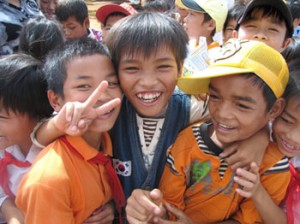 Healing the emotional and environmental wounds of the Vietnam War by removing landmines and unexploded ordnance (UXO) and planting trees on the cleared land, was the original goal of PeaceTrees Vietnam when it was established in 1995. The seed for PeaceTrees Vietnam had been planted 26 years earlier, when PeaceTrees co-founder Jerilyn Brusseau’s brother was killed when his helicopter was shot down in one of Vietnam’s southern provinces. Her desire to turn sorrow into service resulted in the first visit of PeaceTrees “citizen diplomats” soon after the U.S. and Vietnam normalized their diplomatic relations.
Healing the emotional and environmental wounds of the Vietnam War by removing landmines and unexploded ordnance (UXO) and planting trees on the cleared land, was the original goal of PeaceTrees Vietnam when it was established in 1995. The seed for PeaceTrees Vietnam had been planted 26 years earlier, when PeaceTrees co-founder Jerilyn Brusseau’s brother was killed when his helicopter was shot down in one of Vietnam’s southern provinces. Her desire to turn sorrow into service resulted in the first visit of PeaceTrees “citizen diplomats” soon after the U.S. and Vietnam normalized their diplomatic relations.
In the intervening 16 years, the mission of PeaceTrees Vietnam –to renew relationships with the people of Vietnam and to promote a safe, healthy future for its families and children – has remained true, while the programs have greatly expanded. “It’s a holistic approach to mine action,” explains Executive Director Blair Burroughs, leading to community building on a broad scale, with a broad and complex impact.
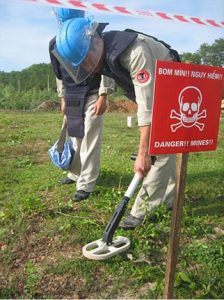 Burroughs starts the story with the magnitude of the problem of mines and unexploded ordnance. The statistics are staggering. From 1945 to 1975, almost four times the amount of munitions was deployed in Vietnam than were used throughout the entire world in WW II. Over 15 million tons of explosives were dropped by U.S. forces—equivalent to the power of 400 Hiroshima-sized atomic bombs. On average, ten percent of the munitions did not explode, which means that they pose an ongoing threat to people who might come across them in the countryside. One type – cluster bombs or “bombies” – had a particularly high failure rate and remain as dangerous today as when they were dropped. Sadly, these bombies can look like toys to children, who may be injured or killed when they attempt to play with them.
Burroughs starts the story with the magnitude of the problem of mines and unexploded ordnance. The statistics are staggering. From 1945 to 1975, almost four times the amount of munitions was deployed in Vietnam than were used throughout the entire world in WW II. Over 15 million tons of explosives were dropped by U.S. forces—equivalent to the power of 400 Hiroshima-sized atomic bombs. On average, ten percent of the munitions did not explode, which means that they pose an ongoing threat to people who might come across them in the countryside. One type – cluster bombs or “bombies” – had a particularly high failure rate and remain as dangerous today as when they were dropped. Sadly, these bombies can look like toys to children, who may be injured or killed when they attempt to play with them.
From its outset, PeaceTrees Vietnam chose to focus on Quang Tri Province in central Vietnam, once the northernmost province of the Republic of Vietnam. Already a poor region due to its geography of steep slopes, narrow valleys, and unproductive soils, Quang Tri was disproportionally affected by activities during the war. Located near the demilitarized zone (DMZ) and the Ho Chi Minh trail, it housed many American bases, and consequently bears more than its share of war remnants. More than 40% of the ordnance used by American forces in the war was dropped in Quang Tri Province, which is roughly 1.2 times the size of the State of Rhode Island. If all the ordnance used there were to be spread out over the entire province, each square meter of land would have been bombarded with an average of 140 pounds of ordnance from both aerial and naval attacks.
The poverty of the province leads many residents to try to supplement their incomes by collecting scrap metal, much of which can be deadly. Indeed, scrap metal collection is the most hazardous occupation in the province. Farming, a more traditional occupation, is the second most deadly occupation, as farmers can unknowingly come across deadly ordnance while plowing their fields.
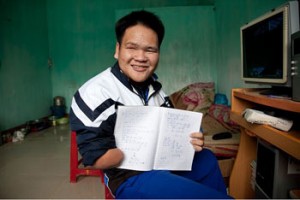 This grim picture is in stark contrast to Executive Director Burroughs’ excitement and enthusiasm. He clearly relishes the challenges of finding creative ways to address the problems, from individual victims to the community as a whole. To educate people about the risks from mines, PeaceTrees Vietnam has worked in local traditions, incorporating role-playing and skits along with traditional songs. Burroughs’ office walls are covered in colorful posters to warn about mines, the result of a poster contest sponsored by PeaceTrees Vietnam. Radio service announcements target vulnerable populations and those who collect scrap metal.
This grim picture is in stark contrast to Executive Director Burroughs’ excitement and enthusiasm. He clearly relishes the challenges of finding creative ways to address the problems, from individual victims to the community as a whole. To educate people about the risks from mines, PeaceTrees Vietnam has worked in local traditions, incorporating role-playing and skits along with traditional songs. Burroughs’ office walls are covered in colorful posters to warn about mines, the result of a poster contest sponsored by PeaceTrees Vietnam. Radio service announcements target vulnerable populations and those who collect scrap metal.
From its inception, PeaceTrees Vietnam has provided aid to victims of accidents. It strives to find creative ways to help such victims, particularly after their initial hospitalization. Sometimes a student needs an apartment in a nearby city so that he can attend high school and thus attain a more productive future. Children of accident victims need only $50 per child per year to stay in school, and PeaceTrees Vietnam provided scholarships to 200 such children this year. A farming family that lost its breadwinner now has a water buffalo to plow the fields, thanks to PeaceTrees Vietnam.
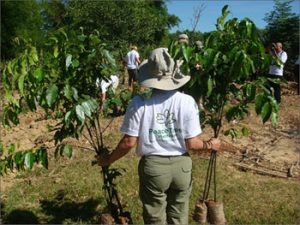 In recent years, PeaceTrees has expanded its programs in the community in partnership with local groups as well as other Seattle-based groups and the U.S. State Department. The Women’s Union of Quang Tri province is a strong community voice. With the Union’s input, PeaceTrees Vietnam has constructed kindergartens and libraries, which also serve as community centers for women in small villages. These centers may be expanded to provide temporary shelters for women who experience domestic violence.
In recent years, PeaceTrees has expanded its programs in the community in partnership with local groups as well as other Seattle-based groups and the U.S. State Department. The Women’s Union of Quang Tri province is a strong community voice. With the Union’s input, PeaceTrees Vietnam has constructed kindergartens and libraries, which also serve as community centers for women in small villages. These centers may be expanded to provide temporary shelters for women who experience domestic violence.
Another project recently implemented in partnership with the Women’s Union focuses on growing nutritionally balanced gardens. PeaceTrees Vietnam’s role is twofold; initially to clear the land of mines and UXO, followed by training in sustainable agricultural techniques and providing necessary tools and seeds. Seattle-based Washington Women’s Foundation has provided the funding for 132 women in the province to be trained in growing nutritionally balanced gardens. In addition, over 200 acres of farmland has been cleared of UXO and restored for use with grants from the U.S. State Department. The land can now be used to grow cash crops such as pepper, coffee, and a fast-growing native acacia tree for pulp. Earned income can help reduce the economic need for scrap metal collection, turning the vicious cycle into a virtuous one.
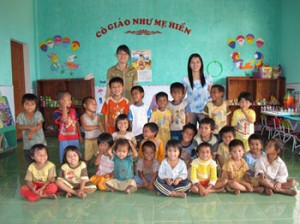 The demining work begun in 1996 continues with former Vietnamese military deminers trained to UN standards. And citizen diplomacy trips continue to renew the relationships between the people of Vietnam and the United States. As Burroughs so eloquently states, “We must remember that everyone, from veterans to opponents of the war, always wanted what was best for the people of Vietnam.” Now PeaceTrees Vietnam is providing a living example of what “the best” can mean.
The demining work begun in 1996 continues with former Vietnamese military deminers trained to UN standards. And citizen diplomacy trips continue to renew the relationships between the people of Vietnam and the United States. As Burroughs so eloquently states, “We must remember that everyone, from veterans to opponents of the war, always wanted what was best for the people of Vietnam.” Now PeaceTrees Vietnam is providing a living example of what “the best” can mean.
Back to Top
Changemaker
Kristin Hayden, Founder of OneWorld Now!
By Carolyn Hubbard
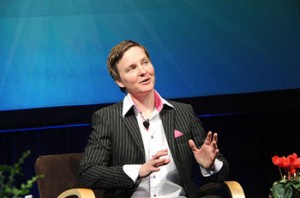 Kristin felt the tension rising in the room as she danced with the boy at her host family’s party. She was 15 years old at the time, on a Rotary Exchange program in Johannesburg, South Africa, during Apartheid. “We were really making people uncomfortable,” Kristin recalls. “But I was having so much fun.” For the first time since arriving in South Africa, she had finally found someone she could relate to, a new friendship that felt genuine. The only problem: he was black.
Kristin felt the tension rising in the room as she danced with the boy at her host family’s party. She was 15 years old at the time, on a Rotary Exchange program in Johannesburg, South Africa, during Apartheid. “We were really making people uncomfortable,” Kristin recalls. “But I was having so much fun.” For the first time since arriving in South Africa, she had finally found someone she could relate to, a new friendship that felt genuine. The only problem: he was black.
It was hard for her to fathom that she couldn’t pursue this friendship because of politics. She was stuck between wanting to respect her host family’s rules and her own moral code. How do you deal with that kind of an injustice? Thinking back to that moment, Kristen pauses, and then explains, “There were forces way bigger than me at play, and I didn’t know how to navigate them in a way that felt empowering.”
It was a bitter lesson to learn for a young person whose parents instilled in her the values of social justice and self-empowerment. But it was also one that helped form Kristin’s conviction that she could be and needed to be an agent of change. Fast forward to today: Kristin Hayden is the founder of OneWorld Now!, the Seattle-based organization providing under-served high school students, leadership training, Chinese and Arabic language courses, and international study opportunities. This two-year program provides the students the tools to build their global awareness and to open doors to further international studies.
 Growing up, Kristin knew she had the permission and the possibility to study abroad. She also knew that plenty of other students did not have that same access. “This is not a luxury of the youth now,” she states. But it is a luxury that she wants to make possible for others—especially communities of kids that are most often overlooked and marginalized—by providing them an opportunity to transform their lives.
Growing up, Kristin knew she had the permission and the possibility to study abroad. She also knew that plenty of other students did not have that same access. “This is not a luxury of the youth now,” she states. But it is a luxury that she wants to make possible for others—especially communities of kids that are most often overlooked and marginalized—by providing them an opportunity to transform their lives.
Her experience in South Africa piqued her curiosity about other countries undergoing transformation, or countries where, as she describes it, “there was a lot of hype, [but] where few people have direct experience.” In 1990, she headed to Moscow, Russia, just prior to the dissolution of the Soviet Union, to study for a college semester. “Things were boiling,” she recalls of the oppression, but she also observed that, “when you are under oppression for a long time, you don’t see the change happening.” Having witnessed, almost first hand, the end of Apartheid and the fall of the Soviet Union, two historic moments her high school history teachers said would never happen in their life times, Kristen knows change is possible.
Her own transformation continued, as she picked up a triple major with honors in Soviet Area Studies, Russian Language, and International Relations, at Macalester College in St. Paul, Minnesota. She then honed her skills in global thinking and project management while living and working in London, Paris, Moscow, and Tbilisi, Georgia.
She returned to the States, ready to merge her entrepreneurial acumen with her interest in social justice and international learning opportunities. OneWorld Now! took its first 12 students in 2002, and has been growing ever since.
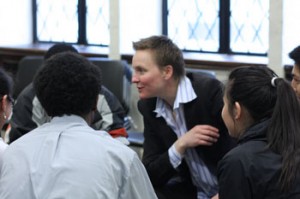 OneWorld Now! is now in it’s 9th year and has enrolled some 2,000 Seattle sophomore and junior high school students in the program. Philmon Haile is one such student that continues to excel. A son of Eritrean refugees in Sudan, Philmon started the OWN program his sophomore year at Garfield High School, studying Mandarin Chinese and building his leadership skills. “He was always late to class,” recalls Kristin, “and had no idea about what he wanted to do with his life.” OWN organized an internship for him to be a congressional page on Capitol Hill, followed by a scholarship to study in China. Philmon continued on with a scholarship to Swarthmore College, returning to China on a Confucius Institute Scholarship. “Students like Philmon are changing the world,” states Hayden. They also exemplify “what is possible and how these transformational experiences can shift the trajectory of a student’s life.”
OneWorld Now! is now in it’s 9th year and has enrolled some 2,000 Seattle sophomore and junior high school students in the program. Philmon Haile is one such student that continues to excel. A son of Eritrean refugees in Sudan, Philmon started the OWN program his sophomore year at Garfield High School, studying Mandarin Chinese and building his leadership skills. “He was always late to class,” recalls Kristin, “and had no idea about what he wanted to do with his life.” OWN organized an internship for him to be a congressional page on Capitol Hill, followed by a scholarship to study in China. Philmon continued on with a scholarship to Swarthmore College, returning to China on a Confucius Institute Scholarship. “Students like Philmon are changing the world,” states Hayden. They also exemplify “what is possible and how these transformational experiences can shift the trajectory of a student’s life.”
Kristin surrounds herself with stories of transformation. Her favorite movie, “Billy Elliot,” tells the story of a scrawny boy who overcomes oppressive social codes and family expectations to become a star ballet dancer. For Billy, dancing is “this fire in my body. I’m just there. Flyin’ like a bird. Like electricity.” Like Billy, Kristin doesn’t question this drive she has; she just lives it. “In my heart of hearts, change is possible,” she says with impressive conviction. Sure there have been frustrations. She notes that her vision for OneWorld Now! exceeds the current reality. And she’s not so sure the U.S is ready for the kinds of changes she wants to see happen. But she sees social entrepreneurs as being the game changers that will create a shift towards a more collaborative and less self-absorbed national culture.
Another inspiration for her is the novella Jonathon Livingston Seagull, a story of perseverance, overcoming conformity and seeking self-perfection. Or simply stated, it’s a story of learning to soar above it all.
Kristin dons her motorcycle helmet and prepares to leave. She’s got Bali, her brand new sparkling cherry red Vespa, waiting for her. It’s what gives her a chance to soar, to feel some quick moments of bliss, before settling in to make sure more teenagers get a chance to travel, and that fewer have to endure a lost friendship because of intolerance and fear.
Back to Top
Welcome New Members
Please welcome our newest Global Washington members. Take a moment to familiarize yourself with their work and think of opportunities for support and collaboration!
The Institute for Self-Reliant Agriculture (SRA) encourages farmers to grow what they eat to provide family nutrition through a progressive approach to self-sufficiency in agriculturally-fertile developing nations. SRA works in cooperation with international organizations, local governments, universities, NGOs, and others throughout the developing world to disseminate the Small-Scale Agriculture Family Self-Reliance Program. www.tifsra.org
Kirlin Charitable Foundation serve as a catalyst and innovative partner in positive social change, helping children and their families become lifelong learners and thoughtfully active, compassionate members of our global community. www.kirlinfoundation.org
Guatemala Village Health is a group of health workers, engineers, teachers, administrators, college students, kids, and more, working to help improve the health of a group of villages in Rio Dulce and in Monterrico – eastern and southwestern areas of Guatemala. They update community assessments, conduct health care screenings, provide clinical care and health education then work at ongoing village improvement projects. http://guatemalavillagehealth.org
- Individual Members
- Saira Abbasey McDonald
- Jennifer Geist
- Robin Hibbs
Back to Top
Announcements
Global Washington Conference registration is now open!
Don’t forget to register for our 3rd Annual Conference, Opportunities and Obstacles in Turbulent Times. This conference, the largest gathering of the international development community on the west coast, will take place on October 31st and November 1st at the Microsoft Conference Center in Redmond. Early bird registration ends on September 28th, so reserve your spot today!
For more information or to register, visit our website.
Join a Community Conversation & Help Us Improve Our State’s Global Education System
Global Washington invites individuals in education, nonprofits, and businesses, to participate in the Community Conversations, a key component of the Global Education Initiative. Community Conversations provide those interested (or even just curious) about encouraging change in our state’s global education priorities with an opportunity to have their voices heard by a wider audience at the Summit on Global Education on November 18, 2011.
These conversations will be held in September and October throughout the state. Check out this link for the dates and locations: https://globalwa.org/our-work/global-education-initiative/community-conversations-on-global-education/
Contact Eugenia Ho at eugenia@globalwa.org for how to get involved.
To Catch a Dollar: A Movie about Micro-finance in America
Looking for a thought-provoking movie? If you’ll be in Los Angeles or New York City from September 23rd to 30th, grab some popcorn and settle in to enjoy To Catch a Dollar: Muhammad Yunus Banks on America. This full-length documentary, which premiered at Sundance Film Festival in 2010, follows Nobel Peace Prize winner Professor Yunus as he brings his unique and revolutionary micro-finance program, Grameen, from Bangladesh to the US. Grameen America is a non-profit organization that provides education, resources, support, and affordable non-collateral micro-loans to help low-income entrepreneurs achieve the American dream.
Funds raised at the screenings will be used to increase distribution of the movie and to bring financial literacy campaigns to schools and communities across the country. To support the movie and Grameen America, Kickstarter receives donations. Read more about the movie, find other screening dates, and learn how to request a screening at http://www.tocatchadollar.com.
4 th Annual 2011 National School Conference on International Youth Exchange
For all educators, international school administrators, and everyone interested in broadening their awareness of youth exchange programs, the 4th Annual 2011 National School Conference on International Youth Exchange, “Building Generations of Youth Exchange,” will provide opportunities to network with colleagues, as well as attend seminars on best practices and more. The Conference follows the two-day 27th CSIET Annual Conference. Mr. Kelly Aramaki, Principal of Beacon Hill International School and the 2010 recipient of the prestigious Milken Educator Award, will deliver the keynote address. The International Youth Exchange conference is cosponsored by Global Washington’s Education Initiative, iEARN, Global Washington member One World Now, as well as the Superintendent of Public Instruction for the state of Washington.
The Conference will be held on October 29, 2011, from 9am to 5:30pm, at the Renaissance Seattle Hotel, 515 Madison St. To register, go to the Council on Standards for International Educational Travel (CSIET) website http://www.csiet.org/index.html. Registration is now open.
Don’t forget to utilize Global Washington’s Career Center for your employment or staffing needs
Global Washington has recently launched a Careers in Global Development Center on our website—your resource for attracting quality talent to your organization! Global Washington members have full access to postings—from paid jobs, to internships, to board positions, to consultant opportunities. Non-members can also post paid global development positions by emailing their job descriptions to us at careercenter@globalwa.org. Job seekers, don’t forget to look here for new positions at our member organizations!
Schools for Salone hosts 1st Annual Together We Can: Building Schools and Hope in Sierra Leone dinner and fundraiser
Global Washington member Schools for Salone will celebrate their past year achievements with a star-studded dinner and fundraiser. Margaret Larson, host of KING-5’s New Day Northwest, will be the Master of Ceremonies. Ishmael Beah, best-selling author of A Long Way Gone: Memoirs of a Boy Soldier, will be there to sign books and discuss his book, and professional soccer players from Sierra Leone will be in attendance. This 1st Annual “Together We Can: Building Schools and Hope in Sierra Leone” will highlight the work Schools for Salone is doing to rebuild rural schools destroyed during Sierra Leone’s civil war.
The dinner and fundraiser will be held on November 3, 2011 at Herban Feast, 3200 1st Ave. S, Seattle. Purchase tickets by October 15th at the Schools for Salone website http://schoolsforsalone.org/Pages/ProjectEvents-AP.html.
Women in the World Breakfast
Tickets are now available for the second annual Women in the World breakfast, presented by the Seattle International Foundation. Dr. Musimbi Kanyoro, president and CEO of the Global Fund for Women, will be the keynote speaker for this event, which celebrates the work Seattle’s organizations are doing to advance the economic and social status of women around the world.
This well-attended breakfast will be held from 7:00 to 10:00 am on November 15, 2011, at the Seattle Four Seasons Hotel, at 99 Union St. Purchase tickets at www.womenintheworld.eventbrite.com.
New Online Tool Builds Awareness about Land Rights
World Resources Institute and Landesa have launched the online education tool, Focus on Land in Africa, which aims to help policymakers and practitioners understand the links between land rights and critical development outcomes in sub-Saharan Africa. Using slideshows, timelines, maps, videos and more, the site aims to provide an engaging way to learn about these crucial issues. For more information, see Landesa’s guest post on the Global Washington blog!
Bringing Business Together for a Better World
Net Impact hosts its 2011 Annual Conference in Portland, OR, from October 27th to 29th. With over 2,500 attendees, 300 speakers and some 100 panels and workshops, the Conference brings together changemakers and leaders to find creative and sustainable ways to use their business savvy to bring social and environmental health to the world. Speakers will include Sally Jewell, President and CEO of REI, and Lord Michael Hastings, Global Head, Citizenship & Diversity, KPMG International.
Register for the conferences at www.netimpact.org/conference. (Early registration ends September 23rd.)
Washington Global Health Alliances Releases New Study
The Washington Global Health Alliance recently completed a study that tallied and mapped the work being done by Washington global health organizations. 59 organizations were included, working in 156 countries on more than 2500 projects. The full study is available here and the economic opportunity portfolio can be accessed here.
The study was released at a special event on Tuesday, September 13th, attended by 60 legislators and members of the global health community. If you missed this event, the program can be viewed here. Other media coverage is listed below. Congratulations to WGHA for this important accomplishment!
Back to Top
Global Washington Events:
September 27th
Special Showing of The Linguists, with Dr. David Harrison
September 29th
Perspectives on International Development at Microsoft
October 31st and November 1st
3rd Annual Global Washington Conference, Opportunities and Obstacles in Turbulent Times
November 18th
Summit on Global Education in Washington State
Back to Top
Other Events:
September 21st
Grameen Foundation Breakfast: How Mobile Phones Can Improve Health Outcomes in Developing Countries
September 22
Lumana Benefit Dinner and Silent Auction
September 24
Make Strides Walkathon
Medrix’s Enchanted Moon Festival – Benefit Dinner and Auction
Agros’ 2011 Tierras de Vida Dinner and Village Experience
October 1
UNA Seattle Annual Membership Meeting
October 6
Power Up Your Giving, The Seattle Foundation
October 10
Choosing Boys Over Girls, and the Consequences of a World of Men
October 12
Business of Hope Luncheon
October 13
How to Change the World One Dead Mosquito at a Time
Jeffrey Sachs: A Plan to Rebuild Our Economy and Politics
October 14-15
WASCLA 2011 Language Access Summit
October 20
Northwest Immigration Rights Project: An Evening at Wing Luke
October 22
UN Day of Celebration
University of Washington Invention to Venture Workshop
November 5
PRE-VENT and Guatemala Village Health dinner/Fund-raiser
Contributors: Bookda Gheisar, Megan Boucher, Anamika P. Ved, Carolyn Hubbard, Sarah Horrigan
Back to Top
Global Washington’s Global Social – Bringing Some Attention Back to Latin America
Posted on September 15, 2011.
Signs of a successful gathering? Tasty food, chilled drinks, compelling conversations, and people still talking way past closing.
Global Washington’s Global Social on Wednesday evening scores high marks on all four, as more than 40 members and guests came to mingle, listen and connect. Four panelists shared their observations and concerns about development work in Latin America. While each brought unique stories, all agreed that Latin America is hard to define as one region and that the current focus on the region’s economic progress is overshadowing the issues of increasing economic inequalities and rates of violence, both of which impact how organizations interact with countries in the region.
Following are summaries of the four panelists’ presentations.
Mauricio Vivero, the Executive Director of Seattle International Foundation, began the presentation by noting that in relation to the rest of the world, Latin America is currently being ignored. “It worries us,” he stated, noting that this lack of attention has created a window for China and Brazil, who are exploiting natural resources (China) and political leadership (Brazil) within Central and South America. While this kind of investment leads to economic progress and an overall percentage drop in poverty, inequality is growing. “Inequality in most countries has gone up in the last ten years,” cited Vivero.
Of prime concern is the assumed economic equality because of recent progress. For example, Vivero noted that in 2010, citizens in El Salvador received US$3.8 billion in remittances, mostly from family members and connections in the U.S. He went on to explain that these remittances now dwarf corporate investment and complicate development policies. But they don’t provide a country security. “How do you do development in a rich country?” posed Vivero, also noting that in El Salvador, and throughout Central America, the main issues of the day for people are crime, violence, and insecurity caused by the growing inequalities.
Sam Snyder, Executive Director of the Create Good Foundation, shared how his perception of the region was far removed from the reality of what he saw in Guatemala. He had gone there to meet with coffee co-ops and farmers as part of the Pura Vida coffee business, but was “surprised to see the exact same poverty as I saw in Africa.” (Before joining Create Good/Pura Vida, Sam was a Peace Corps volunteer in Cote d’Ivoire.) “There was no water, sanitation, they didn’t have enough land.” Snyder’s focus quickly transitioned to asking the farmers what their needs are and focusing on those through the Create Good Foundation. They started to partner with Ecofiltro, a Guatemalan-owned water filtration business, to handle their distribution to many communities from which they buy their coffee. Crime does concern him. He’s aware of the impact it has on the people with whom he works and questions how to deal with such a complicated issue.
Dick Moxon, Special Projects Coordinator for Global Partnerships, focused on the status of micro-finance programs in the region. He pointed out that “this is a relatively optimistic time in South America,” making it easier for organizations to be successful. While the U.S. still muddles through a financial crisis, “Latin American countries have come out of their crises and are doing well.” All of this bodes well for investors, and thus for micro-finance programs. The problem begins with the political models of the various countries. “There are two models in vogue,” Moxon explained. “The Chavez model and the Lula model.” Countries with the more authoritarian, or left of center, Chavez model are perceived as more risky. “Our funders don’t want us to put too much money in those countries,” Moxon stated, giving Nicaragua as an example. That said, Moxon pointed out that many countries, such as Bolivia, have excellent micro-finance laws and have regulated interest rates, while “our friends in Mexico have their own unique system.” Moxon also noted that crime has many impacts on their work, citing how organizations in El Salvador now have to pay into a protection racket. Global Partnerships has begun to also focus on short-term financing options, and has partnered with Sustainable Harvest.
Serena Cosgrove, Assistant Professor at Seattle University and author of Leadership from the Margins: Women and Civil Society Organizations in Argentina, Chile, and El Salvador, wrapped up the presentations by looking at the issues from a “micro level.”
“Ethnographic detail absorbs me,” Cosgrove stated as she focused on how violence and insecurity is impacting El Salvadorans on a daily basis. She noted that the country has one of the highest homicide rates in the world. Cosgrove lived in El Salvador from 1989 to 1993, during some of the gravest years of the country’s unrest. But today, she states, “it feels more unsafe now than in 1989 [a particularly gruesome year during the 12-year civil war.]”
She provided a poignant example of the issues of security with a story of a friend’s daughter whose cell phone is stolen each time she takes the public bus. Yet, if she doesn’t take a phone with her, what does she do if something happens to her? Cosgrove encouraged all of us to imagine what it would be like if our daily lives were dictated by such choices of personal security. She noted how these increasing levels of violence and crime impact all levels of society, citing that young women in the middle class have very limited movement because of the violence.
Further challenging the illusions of progress, Cosgrove impressed the need to notice the income inequalities and extreme poverty in Latin America. One woman in El Salvador even mentioned to Cosgrove “we are worse off now than during the war. At least during the war we had a dream.” Despite the fact that big donors are investing less money into the region, Cosgrove noted that some sectors of civil society are doing great, mentioning that many organizations that are successful are women-directed. “The struggle has only just begun,” finished Cosgrove. “There is still so much that needs to be done to address the inequalities that lead to the conflict.”
Many of the attendees stayed to meet with one another to discuss their programs and strategies. It was an evening charged with energy and intention, and one that will no doubt lead to more people paying a bit more attention to this complex region we call Latin America.
Global Washington convenes Disaster Relief organizations to share experiences with supermodel Petra Nemcova
Posted on September 14, 2011.
Supermodel Petra Nemcova’s surviving the 2004 tsunami while in Phuket, Thailand, led her to establishing the Happy Hearts Fund, a charitable organization to address what she called “the hopelessness in the eyes of children” that she saw when she returned to Thailand after the tsunami. She wanted to close the “gap” that exists after first responders leave a disaster site and before full-scale reconstruction has begun by providing “islands of safety” for children in the form of sustainable schools. She explained the model behind the Happy Hearts Fund to a gathering of representatives from 8 different disaster relief organizations that are members of Global Washington.
Following Petra’s brief presentation, the Global Washington members had a lively discussion about their experiences – both positive and negative – in disaster relief work. Beryl Cheal of Disaster Training International pointed out that there are certain places in the world where you know there are going to be disasters (such as the Philippines), so disaster preparedness is important. John Scanlon of Oxfam shared the names of four initiatives – the Sphere Project, People in Aid, the Humanitarian Accountability Project (HAP), and the Active Learning Network for Accountability and Performance (ALNAP) – that are trying to improve quality and accountability in the humanitarian sector. Mercy Corps shared its experience using information and communications technology (ICT) to collect information on maternal health in Indonesia.
Many agreed that having a local partner “on the ground” in a disaster area is important. Petra commented that the Happy Hearts Fund criteria for taking on a project include having a local NGO or corporation in place, as well as needing good local community engagement, reflecting Global Washington’s principle of local ownership.
Member Guest Blog: Web-based Education Tool Aims to Mainstream Land Rights into International Development Thinking
Posted on September 12, 2011.
By Anna Knox and Peter Veit
Regardless of what matters to you – access to education, universal food security, strengthening women’s rights, or a healthier environment – land rights plays a key role in achieving these goals.
When people have secure access to land, it can lead to:
- Economic development through increased agricultural productivity,
- Improved childhood nutrition,
- Increased school attendance and investments in basic education,
- Increased environmental stewardship,
- Reduced potential for social instability and conflict,
- Reduce vulnerability to domestic violence
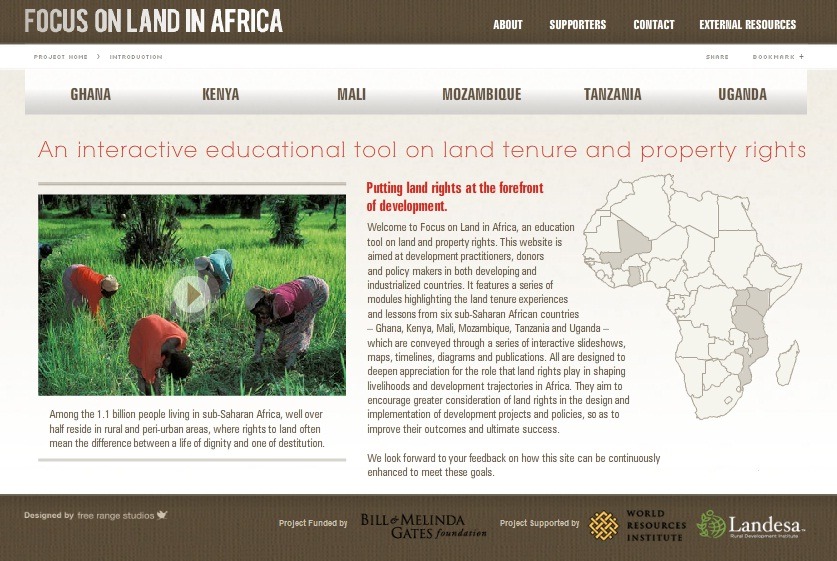 Focus on Land in Africa, a recently launched web-based tool focused on sub-Saharan Africa, aims to help policymakers and practitioners understand the links between land rights and critical development outcomes. Designed by World Resources Institute and Landesa as an online education tool, the site is interactive and uses slideshows, timelines, maps, videos and more in order to appeal to and engage users. Currently, the tool features lessons drawn from six sub-Saharan African countries: Ghana, Kenya, Mali, Mozambique, Tanzania, and Uganda. These lessons were developed with funding support provided by the Bill & Melinda Gates Foundation. More countries will be featured as the tool grows.
Focus on Land in Africa, a recently launched web-based tool focused on sub-Saharan Africa, aims to help policymakers and practitioners understand the links between land rights and critical development outcomes. Designed by World Resources Institute and Landesa as an online education tool, the site is interactive and uses slideshows, timelines, maps, videos and more in order to appeal to and engage users. Currently, the tool features lessons drawn from six sub-Saharan African countries: Ghana, Kenya, Mali, Mozambique, Tanzania, and Uganda. These lessons were developed with funding support provided by the Bill & Melinda Gates Foundation. More countries will be featured as the tool grows.
The education tool helps connect the dots between in-depth research and what gets filtered onto the front page of our newspapers now and then. How are the conflicts between herders and farmers in Mali connected to land rights? How are some women in Ghana using customary rules to gain greater control over land? Do villagers in Tanzania have legal rights to land that they do not have title to? Is the expansion of biofuels threatening people’s land rights in Africa? The site deepens understanding of these critical issues beyond what a simple newspaper or magazine article can convey, but without having to wade through dense research reports and complex language.
The transformational nature of access to land and secure rights to land has been illustrated by land to the tiller programs in Japan, Taiwan and South Korea, which were instrumental in spurring economic development after World War II. More recently, a number of tenure reforms have been implemented in sub-Saharan Africa, in such countries as Burkina Faso, Mozambique, and Tanzania. Increasingly, African governments are ackn0wleding the importance of legally recognizing the land rights of communities who have farmed, herded, lived on and otherwise depended on the land and its natural resources for years. In the wake of these promising changes, sharing lessons of experience is critical to nurturing new land reform efforts and continuously improving current strategies. The tool supports this sort of cross-fertilization.
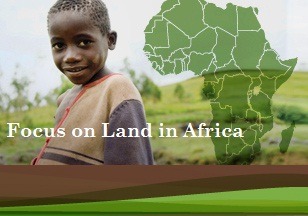 NGOs working in the fields of maternal health, children’s nutrition, education, women’s rights, and the environment can increase the effectiveness of their work when they understand the role of land tenure and integrate this thinking into their own poverty alleviation approaches. Often dismissed as too complex, land tenure issues are regularly overlooked by other development sectors. This web-based tool helps untangle the complexity by presenting the issues in lesson formats tied to real-life challenges and solutions.
NGOs working in the fields of maternal health, children’s nutrition, education, women’s rights, and the environment can increase the effectiveness of their work when they understand the role of land tenure and integrate this thinking into their own poverty alleviation approaches. Often dismissed as too complex, land tenure issues are regularly overlooked by other development sectors. This web-based tool helps untangle the complexity by presenting the issues in lesson formats tied to real-life challenges and solutions.
Focus on Land in Africa is meant to be a free educational resource for development practitioners, policymakers, students, researchers, academics and other audiences interested in learning more about the intersection between land rights and international development issues.
Comments on the Focus on Land in Africa tool and on this blog post are welcomed.
Anna Knox is the senior director of Africa Programs at Landesa, a non-governmental development organization working to secure land rights for the world’s poorest people.
Peter Veit is the project manager for the Equity, Poverty and Environment Initiative at World Resources Institute (WRI). WRI is a global environmental think tank that goes beyond research to put ideas into action, working at the intersection of environment and human needs.
Interested in helping to shape recommendations for the future of global education in our state? Help us by hosting or joining a conversation!
Posted on September 9, 2011.
The Global Education Initiative is moving quickly to gear up towards the Summit on Global Education on November 18, 2011. Thanks to our dedicated coordinating committee and task force members who conducted interviews with experts in the field, the first round of information gathering has been well underway. From the interview feedback, we have a great start on recommendations and inputs on improving the global education offerings in Washington State.
Now Global Washington has embarked on the second phase of information gathering – Community Conversations!
A series of community conversations will be held in September and October to gather key recommendations and inputs from diverse groups of practitioners across the state. They include individuals in education, nonprofits and businesses. In order to ensure a well-rounded geographic representation, these community conversations will cover different parts of the state.
Stay tuned for our announcements on the dates and locations very soon! If you are interested in hosting a conversation, please email eugenia@globalwa.org.
August 2011 Newsletter
Posted on August 18, 2011.
Welcome to the August 2011 issue of the Global Washington newsletter. If you would like to contact us directly, please email us.
IN THIS ISSUE
Note from our Executive Director

Greetings,
Our office has been so busy as we are getting ready for several large events.
The first of these events is Reforming Aid, Transforming the World on August 30th. This event will highlight a critical conversation about aid and aid effectiveness and update you about Presidential Policy Directive and the QDDR And the discussions in DC about the 2012 budget. We know that the budget cuts can have a dramatic impact on the international development community. Global Washington will continue to identify ways that we can advocate across key global development issues at the local, national, and global level. Register here now for this event.
The second event is the Summit on Global Education in Washington State. Throughout this year, Global Washington has been building a collaborative plan to create a shared strategy for global education in Washington State. Our vision is to prepare students to enter the professional world as knowledgeable global citizens and create competent global leaders in Washington State and internationally. We also added to the resources we offer to the international development community by developing our new Career Center. Our goal with this critical resource is to continue to provide the tools you need to build your capacity. Global Washington is also building up this sector by mentoring and training up to 20 interns during each quarter. We see a great deal of value in helping to support these future leaders of global development. Register here now for the summit. We are thrilled to announce Seattle University as our Presenting Sponsor for this event.
The last event is our upcoming third annual conference: Opportunities and Obstacles in Turbulent Times. Opportunities and Obstacles will build on the success of the previous years’ conferences. The first annual conference in 2009, A Blueprint for Action, convened over 300 people to build a strategy for collaborative work in the sector and discuss Global Washington’s role as a convening body. The 2010 Conference, Bridges To Breakthroughs: How Partnerships And Innovation Are Changing The World was attended by over 400 people and focused on new ideas and the role of cross-sector, cross-issue collaborative efforts in development work. We are happy to announce that Microsoft is once again our Presenting Sponsor and will host the event.
The annual conference is an important milestone in Global Washington’s work to convene, strengthen, and advocate on behalf of the global development sector in the state. Diverse players will find opportunities for collaboration and high-caliber speakers will provide valuable insight and the latest knowledge. All of this increases the impact of the work being done around the world, and enhances the reputation of Washington State as an international hub for innovative and effective development activity. Small and large organizations, businesses, government, academic institutions, and interested individuals are all encouraged to participate, joining our mission of working together to create a more equitable and prosperous world. I hope that you have seen the request for abstracts for our member organizations to present at the conference. Be sure to submit your presentations to us and use this opportunity to showcase your work.
We hope to see you at these three meetings and look forward to your participation in our many programs and our annual conference.
In unity,

Bookda Gheisar, Executive Director
Featured Story
Foreign Assistance: Past, Present, Future
By Sarah Horrigan
The year was 1961. In the United States, President John F. Kennedy was inaugurated and gave the first-ever live presidential news conference. U.S. Freedom Riders began interstate bus rides to test the decision of the U.S. Supreme Court on integration. Alan Shepard became the first American in space. In other parts of the world, construction of the Berlin Wall began as Cold War tensions increased, the Bay of Pigs invasion of Cuba failed, and the first American helicopters arrived in Saigon, signaling the beginning of the Vietnam War. In Liverpool, England, the Beatles made their first appearance at the Cavern Club. In the U.S. Congress, the Foreign Assistance Act of 1961 was passed and signed into law.
In the following 50 years, the Foreign Assistance Act has been amended, and over 20 pieces of additional legislation have been passed, some of which establish authorities that lead to confusion within overall U.S. foreign policy. Many development experts view the current collection of legislation as being out-of date and not reflecting current international conditions; some also believe that the Foreign Assistance Act has to be rewritten for coherence and streamlining.
On August 30, Global Washington will convene a panel of policy experts who have been part of the discussion about foreign assistance reform for many years. “Reforming Aid, Transforming the World” will bring together U.S. Representative Adam Smith, National Security Council Senior Director Gayle Smith (invited), and World Vision Senior Vice President Kent Hill.
Adam Smith, now in his 8th term in the U.S. House of Representatives, serves as the Ranking Member of the House Armed Services Committee. Until recently, he also served on both the House Foreign Affairs Committee and the House Permanent Select Committee on Intelligence. Given his committee assignments and extensive travel, Smith has unique insights into today’s foremost national security issues, including the ongoing conflict in Afghanistan as well as our larger efforts to stop the spread of extremist groups and their violent ideology around the globe. Smith has traveled to Afghanistan, Pakistan, Iraq, countries throughout the Middle East as well as countries across Eastern, Central and Northern Africa where U.S. national security interests are most apparent. Harnessing his committee and travel experience, Smith has authored and passed legislation on national security issues such as strategic communication, irregular warfare, and international development.
Gayle Smith (invited) is Special Assistant to the President and Senior Director at the National Security Council, where she is responsible for global development, democracy, stabilization, and humanitarian assistance issues. She was instrumental in developing the Presidential Policy Directive on Global Development, the first such presidential directive on the topic. She was previously a Senior Fellow at the Center for American Progress, Co-Chair of the ENOUGH Project, and Co-Founder of the Modernizing Foreign Assistance Network. During the Clinton Administration, Smith served as Special Assistant to the President and Senior Director for African Affairs at the NSC, and as Senior Advisor to the Administrator and Chief of Staff of the U.S. Agency for International Development. She was based in Africa for over 20 years as a journalist, and has also consulted for a wide range of NGOs, foundations, and governmental organizations.
Kent R. Hill joined World Vision (a Global Washington member organization) in February 2011, after more than three decades serving in U.S. Government, academic, and non-profit leadership roles. As head of WVUS international programs, Kent collaborates with the international partnership of World Vision to help facilitate the overseas allocation of resources from government grants, corporate donated goods, and individual donors. Kent is based in the Washington, D.C., office. Kent served from 2001 to 2005 as U.S. Agency for International Development (USAID) Assistant Administrator of Europe and Eurasia, and was responsible for U.S. foreign assistance to 26 countries in Eastern Europe and the former Soviet Union. Between 2005 and 2009, he was Assistant Administrator of the Bureau for Global Health. Kent has extensive experience with multiple US Government departments and agencies, international assistance agencies from other countries, and hundreds of U.S. and international NGOs, including faith-based organizations.
Back to Top
Featured Organization: Shoreline Community College’s Global Affairs Center
Promoting the Richness of Washington’s Global Work in the Shoreline Community & Beyond
By Bridgette Greenhaw
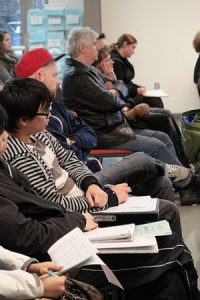 It isn’t just “famous people or folks living in major urban centers like Seattle who are globally affected and effective…”
It isn’t just “famous people or folks living in major urban centers like Seattle who are globally affected and effective…”
Such appears to be the informal motto of Shoreline Community College’s Global Affairs Center (GAC) and its director, Dr. Lawrence (“Larry”) Fuell. When Larry speaks of the successes of Shoreline Community College’s Global Affairs Center, he tells them in stories. These stories highlight how Center programs drive students and community members to awareness and action regarding global issues.
Dr. Fuell describes Shoreline Community College students who, after attending the 2011 GAC Humanitarian Assistance Symposium, organized a community-wide computer drive for a local organization that provides computers to non-profit organizations abroad. He highlights students coming to him in the days following the 2010 Haiti earthquake asking that he coordinate a venue for the community to discuss relief efforts. The same thing happened this past April when students wanted to quickly arrange a discussion on the uprising in Libya. He details a student-created chapter of Amnesty International on campus – again spurred by a Global Affairs Center event.
Dr. Fuell seems excited but not surprised by the action that the Center’s programs stir. He chocks it up to the Center “finding and cultivating that sweet spot of student interest.”
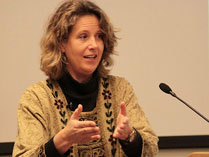 From an outside perspective, what Shoreline Community College (SCC) is doing in terms of global engagement is extremely impressive. Dr. Fuell, a former U.S. Foreign Service Officer who teaches political science, created and currently directs the SCC Global Affairs Center, a “non-partisan program which strives to encourage critical thinking and engagement on global issues affecting global peace, prosperity and equity.” Just completing its third year of programming, the Center aims to stimulate critical thinking; encourage involvement; and show students, faculty and Shoreline community members that they can engage in global issues locally.
From an outside perspective, what Shoreline Community College (SCC) is doing in terms of global engagement is extremely impressive. Dr. Fuell, a former U.S. Foreign Service Officer who teaches political science, created and currently directs the SCC Global Affairs Center, a “non-partisan program which strives to encourage critical thinking and engagement on global issues affecting global peace, prosperity and equity.” Just completing its third year of programming, the Center aims to stimulate critical thinking; encourage involvement; and show students, faculty and Shoreline community members that they can engage in global issues locally.
Dr. Fuell believes that global education– and thus the Center –must focus on four key pillars: awareness, engagement, collaboration through effective partnerships, and ongoing sustainable engagement that does not try to “reinvent the wheel.”
In addition to SCC students and faculty, the Center aims to reach community members. Events are widely promoted beyond SCC’s student body and often take place in the evenings and on weekends to ensure that community members can attend.
The Center’s programming focuses on symposiums, speaker events, campus town halls and small-group evening discussions. The topics of these events run the gamut of global issues. Programming in 2010/2011 included a symposium centered on the debate around immigration policy in the U.S. and Europe. The Center’s second annual International Humanitarian Assistance Symposium focused on how NGOs bring relief, development and equity to people around the globe. A series of events in commemoration of Earth Week focused on national and international policies regarding water, food, health and other environmental issues.
In 2009/2010 programming included discussions on US-China relations; a student-requested campus discussion on the Haiti earthquake; and a series of “Great Discussions”– weekly small group dialogues with community members, faculty and students centered on current foreign policy issues. Topics often attempt to connect SCC’s learning focuses with global issues. For example, a recent speaker from Guatemala with ties to the SCC nursing program, was able to engage nursing students, who might otherwise not engage in SCC’s global dialogue.
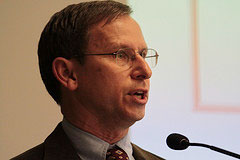
SCC hosts a number of other globally focused programs with which the GAC collaborates. SCC has one of the only community college study abroad programs, some of which have a service learning component. SCC also features an international studies track, which prepares students for a four-year college degree. Global Pathways is an SCC umbrella program that prepares students in and out of the classroom for globally focused post-college lives. Student clubs, such as the Worldly Philosophers and Dismal Scientists Society (WPDSS) club, often focuses on international political and economic issues.
There are numerous opportunities to engage with SCC’s Global Affairs Center. For those interested in attending a 2011/2012 program, speaking at an upcoming event, providing materials on a local organization or program, connecting with Shoreline area students, or finding out how to support the Center, please visit www.shoreline.edu/gac or email gac@shoreline.edu.
The Center will host a symposium this fall that focuses on how life has changed since the tragic events of 9/11 (2001). According to Larry, the GAC will continue this next year to “reach beyond the choir” to students and community members who are not naturally interested in global issues or who do not automatically see their lives as globally relevant.
With the increasing importance of globally competent students and community members – particularly in Washington state – the efforts of SCC’s Global Affairs Center are critical. The GAC will continue striving to remind Shoreline community members and SCC students that, as Dr. Fuell puts it, “Washington is rich in global resources and NGOs…and you don’t have to go overseas to be globally involved.”
Back to Top
Changemaker: Sandy Kemper, Founder of Smiles Forever
By Carolyn Hubbard
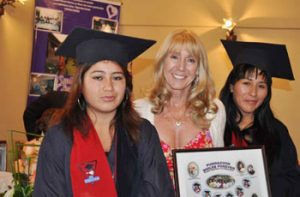 The first time Sandy Kemper met Jobanna, she was a submissive young single mother getting her teeth cleaned at her resident shelter for indigenous women. Today, Jobanna is a confident dental hygienist, helping other women and advocating for the profession. Hers is just one of the many stories that illustrate Sandy’s success as founder and director of Smiles Forever, the Seattle-based non-profit organization that provides dental hygienist training and job placement for indigenous women in Cochabamba, Bolivia.
The first time Sandy Kemper met Jobanna, she was a submissive young single mother getting her teeth cleaned at her resident shelter for indigenous women. Today, Jobanna is a confident dental hygienist, helping other women and advocating for the profession. Hers is just one of the many stories that illustrate Sandy’s success as founder and director of Smiles Forever, the Seattle-based non-profit organization that provides dental hygienist training and job placement for indigenous women in Cochabamba, Bolivia.
Born in south Seattle, Sandy worked as a dental hygienist from the moment she finished her training program. She raised a son, traveled occasionally, and spent weekends waterskiing or alpine skiing. As her son approached his college years, and as she tired of cleaning people’s teeth day in and day out, Sandy decided it was time for a change.
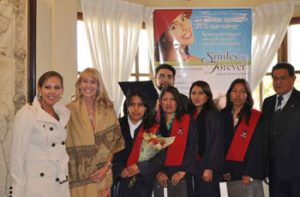 In 1999, she signed up for a 10-day program in which dentists provide free dental care for indigenous women and children at the Madre de Dios shelter in Cochabamba, Bolivia. Sandy’s job was to pull teeth, rather than clean them, often without any anesthetic and with the patient lying over a couple of wooden desk chairs. After some 30 years as a dental hygienist, the lack of preventative care shocked her and she was struck by the abject poverty in which they lived. “I would go home and sob, wondering what was going to happen to them,” Sandy recalls.
In 1999, she signed up for a 10-day program in which dentists provide free dental care for indigenous women and children at the Madre de Dios shelter in Cochabamba, Bolivia. Sandy’s job was to pull teeth, rather than clean them, often without any anesthetic and with the patient lying over a couple of wooden desk chairs. After some 30 years as a dental hygienist, the lack of preventative care shocked her and she was struck by the abject poverty in which they lived. “I would go home and sob, wondering what was going to happen to them,” Sandy recalls.
She returned to Seattle, convinced that she needed to do something to help. “I didn’t know what I was going to do,” she explains. Friends and family encouraged her to explore ways to help, and so she went back, this time alone, and the idea “just clicked:” She would train a couple of the women in the shelter to provide dental care to the others.
Developing a training program in a country you hardly know, let alone speak the language, might be considered a bit risky by some, but not Sandy. Tall and fit, she listens intently and speaks with a conviction present in those who forego the comforts of the everyday and plunge into humanitarian work. She’s determined and she’s tenacious. Sandy mentions that having learning challenges as a child taught her to not give up. “Once I get it, I get it,” she explains. “But I might need to find other ways to get there. I have no fear of failure.”
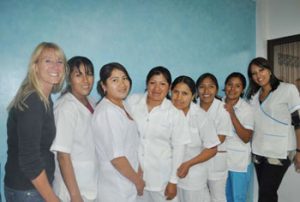 Her determination worked. She took a loan out on her house to buy a dental chair, traveled once again to Bolivia and recruited six teenagers from the shelter as her first students. The ball was rolling, but not the funding. Sandy continues to privately finance the program, but has had no regrets about the changes in her lifestyle. “It’s a thrill to help somebody. To be able to give somebody something is a wonderful feeling.”
Her determination worked. She took a loan out on her house to buy a dental chair, traveled once again to Bolivia and recruited six teenagers from the shelter as her first students. The ball was rolling, but not the funding. Sandy continues to privately finance the program, but has had no regrets about the changes in her lifestyle. “It’s a thrill to help somebody. To be able to give somebody something is a wonderful feeling.”
With 11 years of activity and growth, Smiles Forever now has two training clinics in Cochabamba, open to women who cannot afford other schooling. Trainee hygienists provide services to the Madre de Dios shelter residents, then to the general public before finding positions at dental offices. They are then supported to continue their education or become trainers for the next class of hygienists. So far, thirty-two young women have completed the training program. The Bolivian government recognizes the school’s curriculum, which permits students to receive national titles. Sandy emphasizes that these women not only receive professional opportunities, they build confidence that empowers them to leave a cycle of poverty. “Once they get self esteem, they are like light bulbs,” she observes.
The program continues to flourish, and Sandy works three jobs and fundraises nonstop to finance the growth. “Sometimes it gets really hard, but every time, I turn the corner and it goes to another level.”
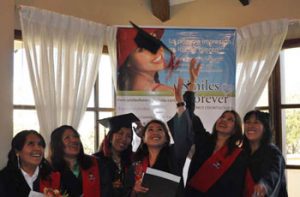 Indeed, Sandy continues to bring her organization to new levels. She has partnered with Shoreline Community College’s dental hygiene program to provide students and graduates an opportunity to work with Smiles Forever students and participate in a rural community service project outside of Cochabamba, earning credit towards their degree. The Smiles Forever program also enrolls Bolivian nursing students for one year to learn how to identify and treat periodontal diseases. Sandy has also partnered with a burn center in Cochabamba to provide dental care to burn victims. And she’s taking a personal interest in the complicated process of reconstructing cleft palettes, after adopting Andre, born with a cleft palette and now a giggling, playful three year old.
Indeed, Sandy continues to bring her organization to new levels. She has partnered with Shoreline Community College’s dental hygiene program to provide students and graduates an opportunity to work with Smiles Forever students and participate in a rural community service project outside of Cochabamba, earning credit towards their degree. The Smiles Forever program also enrolls Bolivian nursing students for one year to learn how to identify and treat periodontal diseases. Sandy has also partnered with a burn center in Cochabamba to provide dental care to burn victims. And she’s taking a personal interest in the complicated process of reconstructing cleft palettes, after adopting Andre, born with a cleft palette and now a giggling, playful three year old.
This past year, twenty previous students, including Jobanna, traveled from various corners of Cochabamba to honor Sandy at a graduation ceremony. Their speech brought tears to her eyes. It was a well-deserved moment, and a rare chance for Sandy to sit for a few moments and absorb their gratitude and admire their brilliant smiles.
Back to Top
Welcome New Members
Global Washington welcomes the following new member organizations! Please take a moment to familiarize yourself with these organizations and consider opportunities for collaboration and support. Together we are creating a unified voice for the development sector in the state and are working to build an equitable and prosperous world.
Engineers Without Borders – Puget Sound Professional Chapter
Engineers Without Borders (EWB) is a non-profit organization established in 2000 to partner with developing communities worldwide in order to improve their quality of life. This partnership involves the implementation of environmentally and economically sustainable engineering projects, while involving and training responsible engineering professionals and students. http://ewb-pugetsound.org/
The Borgen Project
The Borgen Project believes that leaders of the most powerful nation on earth should be doing more to address global poverty. We’re the innovative, national campaign that is working to make poverty a focus of U.S. foreign policy. http://www.borgenproject.org/
Community Empowerment Network
The Community Empowerment Network is a Whatcom County-based non-profit which empowers rural communities in developing countries by helping residents build basic life skills, habits and mindsets to become more self reliant. We then build on this strong foundation by collaborating closely with residents, their leaders, government and other partners to offer a range of business development services and break down structural barriers so residents can build sustainable livelihoods and improve their quality of life. These efforts break the cycle of poverty, and foster long-term, sustainable development. http://www.endruralpoverty.org/
Individual Members
Back to Top
Announcements
Innovative Collaboration Promotes Small-Scale Coffee Growers
Seattle-based nonprofit investor and Global Washington member, Global Partnerships, has launched a collaborative partnership with Sustainable Harvest, a Portland-based specialty coffee importer, to broaden their outreach to small-scale coffee farmers in Peru and Mexico. In March and July, 2011, Global Partnerships disbursed loans to two cooperatives that are secured by sales contracts. Sustainable Harvest agreed to purchase coffee from the cooperatives and repay Global Partnerships upon receipt of the coffee. This innovative approach reduces the risk of default for Global Partnerships while providing the cooperatives a streamlined method of continued disbursements, which in turn benefits the small-scale coffee farmer.
Seattle Storm Honors Jessica Markowitz and Jerilyn Brusseau
The founders of two Global Washington member organization were recently selected by WNBA championship basketball team Seattle Storm for their annual Women of Inspiration campaign, celebrating women for their outstanding accomplishments, courage, service, and dedication. Jessica Markowitz, founder of Richard’s Rwanda-IMPUHWE and Jerilyn Brusseau, co-founder of PeaceTrees Vietnam were two one of the four local women selected and honored during a pre-game reception and halftime ceremony on Aug. 5, 2011.
Jessica, a junior at Garfield High School in Seattle, stood out for her commitment to civic responsibility and community involvement, which came to force when she founded Richard’s Rwanda-IMPUHWE when only 11 years old.
Motivated to respond to the loss of her brother in the Vietnam War, Jerilyn founded PeaceTrees to create friendship and peace instead of hostility between the people of Vietnam and the United States. She has won numerous awards for her work.
The other women honored by the Seattle Storm were Grethe Cammermeyer, equal rights pioneer; and Barbara Trask, scientist and cancer researcher.
Bill Clapp and Seattle’s Global Development Sector Highlighted
KPLU radio host and global development blogger Tom Paulson recently wrote a three-part series about Seattle’s global development sector’s efforts to build a stronger, more collaborative community. The engaging, witty articles can be accessed on his website, Humanosphere (July 27 and 29, August 1, 2011). Paulson begins the series with the work that the Seattle International Foundation is doing to build opportunities for collaboration, such as a fundraising event launched recently among Jolkona, iLEAP, and SIF. Paulson then identifies Bill and Paula Clapp, Seattle International Foundation and Global Washington founders, as being some of Seattle’s first philanthropists and highlights their influence on the microfinance sector and on building awareness for the need for more cohesion across all global development sectors. The third of the series highlights the burgeoning field of young “do-gooders” and the organization, Hub Seattle, which hopes to provide such people a communal hosted work space. Paulson’s articles bring to the table the challenges and the strength of Global Washington’s mission to convene and strengthen the state’s global development sector.
Book Signing and Lecture by Acclaimed Journalist Alex Perry
World Affairs Council of Seattle presents Alex Perry, TIME’s Africa Bureau Chief and author of Lifeblood: How to Change the World One Dead Mosquito at a Time for a lecture on the impact malaria has had on international aid and development trends and what impact its eradication would have on the African continent and the rest of the world. The event takes place at the Seattle BioMed Auditorium, 307 Westlake Ave. N., Seattle, WA, 98109, on October 13, 2011. A networking reception with light appetizers and a wine bar starts at 6pm, followed by the lecture at 7pm. $10/ 15 for WAC members/nonmembers. Event co-presented by Eliott Bay Book Company, Washington Global Health Alliance, and Global Washington.
Unite for Sight: Conference Announcement
Registration for Unite for Sight’s, 9th Annual Global Health & Innovation Conference, is now open. The conference will be held at Yale University April 21-22, 2012. Unite for Sight, a global health delivery organization, is also currently accepting abstract submissions for presentation. Deadlines for oral/poster abstracts are August 31, with an additional deadline on September 30. Social enterprise pitch abstracts are accepted on a rolling basis. For more details, go to http://www.uniteforsight.org/conference/.
Women of Vision Hosts Fundraising Event Featuring Sheryl WuDunn
Women of Vision, a World Vision affiliate, is hosting a fundraising event for global women’s issues called “make it right. From Oppression to Opportunity” on September 18th, 2011. It will take place at the Hyatt Regency Bellevue from 5:00 to 7:30pm. The event will feature acclaimed author Sheryl WuDunn and writer and women’s advocate Renee Stearns. This fun and informational event will include a book signing, appetizers, and a string quartet. For more information or to register, visit http://www.wovwashington.org/
Seattle International Foundation Announces Call for Applications under its 2011 Global Program
The Seattle International Foundation (SIF) is now accepting applications under its Global Program. The Global Program (small grants for local organizations) supports and fosters local organizations working internationally. SIF is interested in development projects in all regions of the world.
The Global Program is open to 501(c)3 organizations, or those with fiscal sponsorship, with an annual organizational or project budget of less than $2 million (USD). This round, preference will be given to organizations based in the greater Puget Sound region whose work directly impacts the lives of women and girls. The program seeks to support organizations launching new projects, or working to establish or expand an international project or program.
For more information on how to apply: please visit www.seaif.org, or contact Michele Frix (Program Officer) at mfrix@seaif.org.
Global Visionaries Hosts “Global Leadership Teacher Workshop”
On Monday, August 29th, Global Visionaries Executive Director Christopher Fontana is leading a teacher workshop focused on cultivating global leadership in the classroom. The global leadership approach “focuses on social and environmental justice through service learning and leadership skill building. It is an environment in which students are responsible for their own learning and accountable to their fellow classmates.” For more information or to register, email partnerships@global-visionaries.org
Workshop time: Monday, August 29th, 9am to 1pm
Location: Cleveland High School — Room 1201 | 5511 15th Avenue South | Seattle, WA 98108
RSVP: partnerships@global-visionaries.org
Landesa hosts discussion on women’s land rights in India.
On September 13th, join Landesa’s India Country Directory Gregory Rake, and Landesa attorney Deena Ledger for a special briefing on the situation for landless women in India and how ensuring their rights can have a broad positive impact including an increase in children’s education, improved health and nutrition, and less domestic violence. The discussion will focus on the current situation for land rights in India and Landesa’s current programs and future plans in the country. Space is limited. To RSVP, email events@landesa.org or call Hilary Anderson at (206) 257-6148.
Time: September 13th, 4:30pm to 6pm
Location: K&L Gates | 925 4th Ave, Ste 2900 | Seattle, WA 98104
RSVP: events@landesa.org
Have An Open Position? Wondering How To Recruit Volunteers? We Can Help!
Global Washington has recently launched a Careers in Global Development Center on our website—your resource for attracting quality talent to your organization! Global Washington members have full access to postings—from paid jobs, to internships, to board positions, to consultant opportunities. Non-members can also post paid global development positions by emailing their job descriptions to us at careercenter@globalwa.org. For more information or instructions for registering as an employer, email careercenter@globalwa.org.
We are also placing a special focus on volunteer recruitment by hosting a workshop on August 23rd called “Harnessing Volunteer Power.” The workshop will focus on volunteer utilization, recruitment, and retention, and will feature Bookda Gheisar, Executive Director, Global Washington; Rick McKenney, Executive Director, Water for Humans; Stacie Henrickson, Volunteer Coordinator, Friends of the Orphans; and a real-life volunteer!
Registration and more details here: https://app.etapestry.com/cart/GlobalWashington/default/item.php?ref=1910.0.165791815
Showcase Your Art At Global Washington’s Office!
We’re looking for globally-focused paintings or photography to fill up the lonely walls in our office. We host numerous meetings and events so your art will find a lot of admirers here! We are looking for artists who would like to showcase their art here for pre-determined periods of time—more exposure for you and a nicer office for us! If you or someone you know might be interested, please contact megan@globalwa.org.
Seattle Children’s Receives Grant For Life-Saving Infant Respiratory Device
Seattle Children’s Research Institute has just announced the receipt of a $2.3 million grant from the Bill & Melinda Gates Foundation for development of the Seattle Children’s Positive Airway Pressure (Sea-PAP). Sea-PAP–a simple respirator with for premature infants—will be much cheaper than conventional ventilators, making it optimal for use in the developing world, where hundreds of thousands of infants die yearly due to respiratory distress.
For more information about Seattle Children’s Research Institute, visit: http://www.seattlechildrens.org/research.
Global Washington Advertising Campaign To Highlight Development Work In Washington State
In the last quarter of the year, Global Washington will be launching a broad-reaching advertising campaign to highlight the innovative and extensive global development work coming out of the state of Washington. Utilized media will include a variety of print, web, and other sources to reach the widest possible audience. We expect that this exposure will drive a significant amount of traffic to our website, including our development directory. If your organization is not already included, please take a moment to add yourself now! Some data from the directory will also be used in the media campaign.
Back to Top
Global Washington Events:
Tuesday, August 23
Harnessing Volunteer Power
Tuesday, August 30
Reforming Aid, Transforming the World
October 31st and November 1
3rd Annual Global Washington Conference
November 18th
Summit on Global Education in Washington State
Back to Top
Other Events:
Friday, August 19
Delivering Culturally Proficient Services to Diverse Communities: A Global Health Conference
Tuesday, August 23
VIP Forum with Merck Global Health Innovation
Wednesday, August 24
VIP Forum with Merck Global Health Innovation
Wednesday, August 31
Today’s Iran: A Young American’s Perspective
Sunday, September 18
make it right. An evening with Sheryl WuDunn
Wednesday, September 21
Grameen Foundation Breakfast: How Mobile Phones Can Improve Health Outcomes in Developing Countries
Thursday, September 22
Lumana Benefit Dinner and Silent Auction
Saturday, September 24
Make Strides Walkathon
Medrix’s Enchanted Moon Festival – Benefit Dinner And Auction
Agros’ 2011 Tierras de Vida Dinner and Village Experience
Contributors: Sarah Horrigan, Carolyn Hubbard, Bridgette Quinn Greenhaw,
Megan Boucher, Bookda Gheisar
Back to Top
Funding for Foreign Assistance – views from Washington DC
Posted on August 15, 2011.
Every dollar of the U.S. discretionary budget is appropriated by one of 12 appropriations subcommittees, but each of these dollars can have more than one purpose. For example, a dollar spent on Education can be viewed as a dollar for a particular school improvement grant, or it can be viewed as a long-term investment in our Nation’s future. A dollar invested for the construction of highways can also be viewed as a dollar toward generating new jobs for unemployed citizens, or a dollar toward replenishing our country’s critical infrastructure.
Two of the appropriations subcommittees – Defense, and State, Foreign Operations , and Related Programs – may at first seem very different from each other. Defense funds the Pentagon (military personnel; operations and maintenance; research, development, test and evaluation for new weapons systems) and the National Intelligence Agencies (such as the CIA). State, Foreign Operations, and Related Agencies provides funding for State Department activities (such as maintaining our network of overseas embassies) and USAID (whose programs provide much of the U.S. foreign assistance).
Many people, however, are starting to “connect the dots” between these two sets of activities, making the point that both sets of activities are integral to our national security. Tom Nides, the new Deputy Secretary of State for Management, recently made exactly that point in an interview published in “The Cable.” He stated that the State Department and USAID have a national security mandate, and that American diplomats and development experts are part of the front line to keep the country safe and secure. He noted that diplomats and development experts become even more critical in a destabilized world, with potential food shortages and economic turbulence.
In a recent op/ed in the Seattle Times, Washington State representatives Adam Smith and Jim McDermott, along with Global Washington founder Bill Clapp, made a similar argument. “Foreign assistance is the first line of our national defense, making us safer by stabilizing volatile nations,” they said. They also quoted former Secretary of Defense Robert Gates as saying, “development is a lot cheaper than sending soldiers.”
As Global Washington continues to refine its advocacy strategy, we will work to find ways to explain why foreign assistance spending by the Federal government is an important use of taxpayer funds. Explaining how foreign assistance helps national security is one way of making that case.
On August 30, Global Washington will sponsor a panel discussion with Washington D.C. policymakers including Congressman Adam Smith (D-WA) and Gayle Smith (invited), Special Assistant to the President and Senior Adviser, National Security Council, to discuss foreign assistance reform. Please join us for the event!
Volunteerism: Finding the Perfect Match, and Then What?
Posted on August 12, 2011.
It seems like the perfect match: nonprofit organizations need to accomplish their goals with less money and less staff, while unemployed professionals need to keep their skills fresh and their minds alert. Surely these two groups can help each other out. But, creating a mutually beneficial match isn’t as easy for organizations and individuals as it might seem. Sometimes it happens: Take, for example, Global Washington’s ability to corral a team of volunteers and interns to build and develop everything from blogs (this one included) to events to policy reports. But often, organizations struggle with how to handle the volunteer sector.
A couple of statistics, from the Volunteering in America Fact Sheet for 2009, get the mind spinning. (It’s a bit out of date, but socioeconomic trends haven’t changed that much, right?) One survey shows that the higher the education level and the more “robust the nonprofit infrastructure”, the higher the volunteering rates. But, contrary to all logic, higher unemployment rates lead to lower volunteering rates. Can we assume then that well-educated individuals volunteer less once they’re laid off?
Washington State, and Seattle in particular, have some more comforting statistics. Our state ranks 10th among the 50 states and DC in volunteers. Factors accounting for this are our above average level of education (30.7% state vs. 27.7% national with college degrees) and a slightly higher than average number of nonprofits (4.75 per 1,000 residents state vs. 4.45 per 1,000 residents national). But, despite rising unemployment, Washington State actually increased in volunteer hours in 2009, defying the national trend. Kudos to all, Seattle ranks 4th out of 51 large cities for the volunteer rate from 2007 to 2009. (Portland beat us though, coming in 2nd.)
Washington beats out the rest of the US with 20.6% providing professional and management services, versus the national average of 16.7%, with most of the work happening at religious institutions and at schools. The other top jobs in volunteerism are general labor (26.5%) and, no surprise, fundraising (25.2%).
Worth noting from these surveys is the retention rates of volunteers. In other words, once you get people to work for free, how do you keep them? Retention rates increased for volunteers providing activities that they do professionally, namely in management (69.5% to 82.3%) and administration (61.2% to 75.6%). On the other hand, fundraising is one of the few areas where retention rates decreased, from 63.4% to 61.4%.
Why? According to a study conducted for the article, “The New Volunteer Workforce” (Stanford Social Innovation Review, winter 2009), volunteers leave because the organization fails to do the following: match skills to assignments, recognize volunteer’s contributions, measure the value of volunteers, train volunteers (and train staff to train volunteers), and provide strong leadership. Many studies, including those mentioned above, encourage nonprofit organizations to rethink how they manage volunteers. Considering that the value of one hour of volunteer time in Washington state is $21.62, according to the Independent Sector website, successful volunteer management makes financial sense.
How do organizations and individuals find one another? Online resource centers provide both parties a quick and easy way to detail skills, time frames, and expectations in such a way that both parties can make better choices. Global Washington’s Careers in Global Development site is a great resource for finding volunteer opportunities with member organizations, and for Global Washington members to find like-minded volunteers. With proper management and with volunteers able to treat their volunteer ‘gig’ with professionalism, it is possible to make a near perfect match.
Learn more about best practices in volunteer management and how to attract the skill set your organization wants at Global Washington’s workshop, Harnessing Volunteer Power, on August 23rd.
“Back to the Future: Recent Evolutions in EU Development Policy and Its Implications for the Global Development Agenda”
Posted on August 11, 2011.
The European Centre for Development and Policy Management (ECDPM) is an independent foundation established in 1986 to promote cooperation between the European Union and developing countries in Africa, the Caribbean, and the Pacific (ACP). Global Washington members heard a presentation by ECDPM’s Senior Executive for International Relations Andrew Sherriff, on the complex interactions between and among European nations, and how EU development policies might have implications for the global development agenda. Andrew asked the members present if there are parallel trends in the U.S. If you would like to share your thought, please feel free to “comment” in response to this blog.
Andrew presented the EU’s current role in providing “Official Development Assistance” (ODA) to the developing world. (By definition, ODA must be provided by the official (government) sector, its main objective must be the promotion of economic development, and it must have a grant element of at least 25 per cent.) The UN has established a target for each developed country to provide 0.7 per cent of its GNP to ODA by 2015. A few countries (Sweden, Luxembourg) have already met that goal. The U.S. is currently at <0.2 per cent of GNP. With the current worldwide financial crisis, many countries are backing off their current commitments; however, the U.K. and the European Commission are bucking the trend and proposing to raise their contributions. Another way to “increase” ODA would be to broaden the categories that ODA can fund. (The U.S. contribution, for example, would be considerably higher if military aid were included.) Some have suggested that support for security sector reform, such as police forces, be included within the ODA categorization.
Another major change that is influencing the EU’s outlook on its contributions to ODA is the rise of the “BRICS” – the emerging market countries of Brazil, Russia, India, China, and South Africa. BRICS are investing in Africa in a different way from the EU model of investing ODA in good government; over 37 per cent of Africa’s trade is now with BRICS countries. Much of the BRICS investment is in infrastructure, such as roads and transportation routes to access raw materials that the developing countries have.
A further complication is that the fragile and conflict states, countries which could benefit most from outside investment, are often the least well performing. “How do you spend money well?” in fragile states, Andrew asked.
Andrew presented the conclusions of a European Commission “Green Paper” on Developmental Policy, prepared in 2010. [http://ec.europa.eu/development/icenter/repository/GREEN_PAPER_COM_2010_629_POLITIQUE_DEVELOPPEMENT_EN.pdf] The goal of the paper was to launch a debate on how the EU can best support developing countries' efforts to speed up progress towards the Millennium Development Goals centering on four main objectives:
• how to ensure high EU impact development policy, so that every euro spent provides the best value added and value for money, the best leverage and the best legacy of opportunities for generations to come (Andrew noted that ensuring high impact requires measuring results, but cautioned that overemphasis on short-term results may lead to perverse outcomes);
• how to facilitate more, and more inclusive, growth in developing countries, as a means of reducing poverty and providing a chance for all to have a decent living and a perspective for their future;
• how to promote sustainable development as a driver for progress (but noted that blending loans from the private sector may lead to unsustainable debt); and
• how to achieve durable results in the area of agriculture and food security (without additional “new” money).
However, he also noted that this paper was prepared before the Arab Spring of 2011, which could have long-ranging effects, particularly on Northern Africa.
Andrew ended his talk with the title of his talk: Back to the Future. He asked where the EU might be going “back” to:
• The early 1990’s, focusing on sustainable development?
• The 1980’s, focusing on competition and the Cold War?
• The 1960’s, focusing on economic growth?
• The 1950’s, focusing on the political strategy of the Marshall plan?
Do you have any thoughts? Feel free to “comment” below.
Foreign Aid Reform: Why now?
Posted on August 5, 2011.
The Millennium Development Goals were brought into the world during the United Nations Millennium Summit eleven years ago for one purpose: “to set our sights on the eradication of extreme poverty in our time”, as explained by President Barack Obama. The development sector stares down the eight lofty goals every day and each bit of progress improves the lives of citizens of the world. By 2015, the hope is that through effective foreign aid, the world will have eradicated extreme poverty and hunger; achieved universal primary education; promoted gender equality; reduced child mortality; improved maternal health; more efficiently combated HIV/AIDS, malaria, tuberculosis, and other diseases; ensured environmental sustainability; and created a partnership for global development. Describing these goals as “lofty” seems perhaps an understatement. In last year’s August Panel hosted by Global Washington, administrator for the United States Agency for International Development (USAID) Rajiv Shah said that it was vital to demonstrate that the big problems of the world are solvable. So now, four years from the set end date of the summit, we must ask ourselves: what progress have we made? Are these problems as solvable as we would like to believe?
Earlier this year, a Congressional Caucus for Effective Foreign Assistance (CCEFA) was formed by Representative Adam Smith (D-WA) and Representative Ander Crenshaw (R-FL) to address issues with foreign aid and the most effective means to reform. One of their first orders of business was to launch Oxfam America’s updated Foreign Aid 101 report, which was designed to provide a factual overview of U.S. foreign aid. The report designated three major changes to U.S. foreign aid that would lead to broad-based economic growth:
- Fully implementing the U.S. Global Development Policy, which holds aid accountable for fighting poverty first and foremost, and designating more resources to initiatives that will produce sustainable change.
- Modernize the outdated laws, strategies, and structures around U.S. foreign aid. Amendments to the 1961 Foreign Assistance Act have been the main changes to development policy in the intervening years, which leaves many in the community calling the laws cumbersome and ill fitted to 2011 realities.
- Promote local ownership as the most effective path to economic growth.
These sentiments were echoed by USAID in the September 2010 US Strategy for Meeting the Millennium Development Goals. The strategy put forth calls for leveraging innovation, investing in sustainability, tracking development outcomes, and creating accountability on all sides.
The Presidential Policy Directive on Global Development was the first by any U.S. administration. Much of the sentiment previously endorsed by USAID and Oxfam’s report was echoed in the directive. It recognized that “development is vital to U.S. national security and is a strategic, economic, and moral imperative for the United States.” Its approach to global development rested on three main ideas: focusing on sustainable development outcomes, finding new operational models to make the United States a more effective partner, and harnessing development capabilities spread across government. The President too seeks to reform foreign aid into a more effective machine for combating global poverty. His administration’s revitalized operational model has stated the importance of country ownership and has pledged to work through national institutions rather than around them. They have also decided to reallocate resources in support of development initiatives that prove the most effective. It has also been decided that the Administrator of USAID will be included in relevant meetings of the National Security Council. The Presidential Policy Directive acknowledges the need for reform and cooperation within the development sector, with goals similar to those expressed by CCEFA through Oxfam’s revised report.
The Quadrennial Diplomacy and Development Review (QDDR) was launched by Secretary of State Hilary Clinton and modeled after the impressive Quadrennial Defense Review of the Defense Department. Clinton says the inspiration for the massive report began with a simple question:How can we do better?Under the bold-faced banner “Transforming Development to Deliver Results” the QDDR alongside Oxfam and the Presidential Policy Directive expresses similar needs for reform. The QDDR details changes being made to both State and USAID to make more of our development dollars: USAID will be made the lead agency for the Feed the Future and Global Health Initiative presidential missions. Aid will be made more transparent through the creation of a Web-based “dashboard” that publishes State and USAID foreign assistance data. A development lab will be created at USAID to establish an Innovation Fellowship to assist the best practices that come out of development. The White House, USAID, members of congress, and other massive forces in the development sector are beginning to knit themselves together to better cooperate with governments and nonprofits on the ground. The sector is committing to sustainable, transparent programs driven by recipients of aid themselves.
With such a fertile environment surrounding aid reform, what progress has actually been made towards the Millennium Goals? Between 1990 and 2005, the percentage of the world’s population living on less than $1/day dropped from 42% to 25%. Enrollment in primary education has reached 89% in the developing world. The total number of under-5 deaths decreased globally from 12.4 million/year to 8.1 million/year. UNICEF cites that the number of women dying due to complications during pregnancy and childbirth has decreased from 546,000 in 1990 to 358,000 in 2008. We still have a long way to go until the goals set to us have been achieved. But with the White House, USAID, and members of congress calling out for reformed aid that can demonstrate its own effectiveness and create solutions that sustain themselves, these numbers will continue to drop.
With the recession threatening to be the justification for cutting foreign aid projects, making aid as effective as possible is even more pertinent. Global Washington is providing a venue to discuss exactly this issue. From 3:30-5:30 on August 30th in Kane Hall of the University of Washington, U.S. Representative Adam Smith and Kent R. Hill of World Vision will be discussing effective foreign aid reform. Special Assistant to the President Gayle Smith has also been invited. Come and join us to talk about issues that shouldn’t be overlooked.
![]()
 Healing the emotional and environmental wounds of the Vietnam War by removing landmines and unexploded ordnance (UXO) and planting trees on the cleared land, was the original goal of PeaceTrees Vietnam when it was established in 1995. The seed for PeaceTrees Vietnam had been planted 26 years earlier, when PeaceTrees co-founder Jerilyn Brusseau’s brother was killed when his helicopter was shot down in one of Vietnam’s southern provinces. Her desire to turn sorrow into service resulted in the first visit of PeaceTrees “citizen diplomats” soon after the U.S. and Vietnam normalized their diplomatic relations.
Healing the emotional and environmental wounds of the Vietnam War by removing landmines and unexploded ordnance (UXO) and planting trees on the cleared land, was the original goal of PeaceTrees Vietnam when it was established in 1995. The seed for PeaceTrees Vietnam had been planted 26 years earlier, when PeaceTrees co-founder Jerilyn Brusseau’s brother was killed when his helicopter was shot down in one of Vietnam’s southern provinces. Her desire to turn sorrow into service resulted in the first visit of PeaceTrees “citizen diplomats” soon after the U.S. and Vietnam normalized their diplomatic relations. Burroughs starts the story with the magnitude of the problem of mines and unexploded ordnance. The statistics are staggering. From 1945 to 1975, almost four times the amount of munitions was deployed in Vietnam than were used throughout the entire world in WW II. Over 15 million tons of explosives were dropped by U.S. forces—equivalent to the power of 400 Hiroshima-sized atomic bombs. On average, ten percent of the munitions did not explode, which means that they pose an ongoing threat to people who might come across them in the countryside. One type – cluster bombs or “bombies” – had a particularly high failure rate and remain as dangerous today as when they were dropped. Sadly, these bombies can look like toys to children, who may be injured or killed when they attempt to play with them.
Burroughs starts the story with the magnitude of the problem of mines and unexploded ordnance. The statistics are staggering. From 1945 to 1975, almost four times the amount of munitions was deployed in Vietnam than were used throughout the entire world in WW II. Over 15 million tons of explosives were dropped by U.S. forces—equivalent to the power of 400 Hiroshima-sized atomic bombs. On average, ten percent of the munitions did not explode, which means that they pose an ongoing threat to people who might come across them in the countryside. One type – cluster bombs or “bombies” – had a particularly high failure rate and remain as dangerous today as when they were dropped. Sadly, these bombies can look like toys to children, who may be injured or killed when they attempt to play with them. This grim picture is in stark contrast to Executive Director Burroughs’ excitement and enthusiasm. He clearly relishes the challenges of finding creative ways to address the problems, from individual victims to the community as a whole. To educate people about the risks from mines, PeaceTrees Vietnam has worked in local traditions, incorporating role-playing and skits along with traditional songs. Burroughs’ office walls are covered in colorful posters to warn about mines, the result of a poster contest sponsored by PeaceTrees Vietnam. Radio service announcements target vulnerable populations and those who collect scrap metal.
This grim picture is in stark contrast to Executive Director Burroughs’ excitement and enthusiasm. He clearly relishes the challenges of finding creative ways to address the problems, from individual victims to the community as a whole. To educate people about the risks from mines, PeaceTrees Vietnam has worked in local traditions, incorporating role-playing and skits along with traditional songs. Burroughs’ office walls are covered in colorful posters to warn about mines, the result of a poster contest sponsored by PeaceTrees Vietnam. Radio service announcements target vulnerable populations and those who collect scrap metal. In recent years, PeaceTrees has expanded its programs in the community in partnership with local groups as well as other Seattle-based groups and the U.S. State Department. The Women’s Union of Quang Tri province is a strong community voice. With the Union’s input, PeaceTrees Vietnam has constructed kindergartens and libraries, which also serve as community centers for women in small villages. These centers may be expanded to provide temporary shelters for women who experience domestic violence.
In recent years, PeaceTrees has expanded its programs in the community in partnership with local groups as well as other Seattle-based groups and the U.S. State Department. The Women’s Union of Quang Tri province is a strong community voice. With the Union’s input, PeaceTrees Vietnam has constructed kindergartens and libraries, which also serve as community centers for women in small villages. These centers may be expanded to provide temporary shelters for women who experience domestic violence. The demining work begun in 1996 continues with former Vietnamese military deminers trained to UN standards. And citizen diplomacy trips continue to renew the relationships between the people of Vietnam and the United States. As Burroughs so eloquently states, “We must remember that everyone, from veterans to opponents of the war, always wanted what was best for the people of Vietnam.” Now PeaceTrees Vietnam is providing a living example of what “the best” can mean.
The demining work begun in 1996 continues with former Vietnamese military deminers trained to UN standards. And citizen diplomacy trips continue to renew the relationships between the people of Vietnam and the United States. As Burroughs so eloquently states, “We must remember that everyone, from veterans to opponents of the war, always wanted what was best for the people of Vietnam.” Now PeaceTrees Vietnam is providing a living example of what “the best” can mean. Kristin felt the tension rising in the room as she danced with the boy at her host family’s party. She was 15 years old at the time, on a Rotary Exchange program in Johannesburg, South Africa, during Apartheid. “We were really making people uncomfortable,” Kristin recalls. “But I was having so much fun.” For the first time since arriving in South Africa, she had finally found someone she could relate to, a new friendship that felt genuine. The only problem: he was black.
Kristin felt the tension rising in the room as she danced with the boy at her host family’s party. She was 15 years old at the time, on a Rotary Exchange program in Johannesburg, South Africa, during Apartheid. “We were really making people uncomfortable,” Kristin recalls. “But I was having so much fun.” For the first time since arriving in South Africa, she had finally found someone she could relate to, a new friendship that felt genuine. The only problem: he was black. Growing up, Kristin knew she had the permission and the possibility to study abroad. She also knew that plenty of other students did not have that same access. “This is not a luxury of the youth now,” she states. But it is a luxury that she wants to make possible for others—especially communities of kids that are most often overlooked and marginalized—by providing them an opportunity to transform their lives.
Growing up, Kristin knew she had the permission and the possibility to study abroad. She also knew that plenty of other students did not have that same access. “This is not a luxury of the youth now,” she states. But it is a luxury that she wants to make possible for others—especially communities of kids that are most often overlooked and marginalized—by providing them an opportunity to transform their lives. OneWorld Now! is now in it’s 9th year and has enrolled some 2,000 Seattle sophomore and junior high school students in the program. Philmon Haile is one such student that continues to excel. A son of Eritrean refugees in Sudan, Philmon started the OWN program his sophomore year at Garfield High School, studying Mandarin Chinese and building his leadership skills. “He was always late to class,” recalls Kristin, “and had no idea about what he wanted to do with his life.” OWN organized an internship for him to be a congressional page on Capitol Hill, followed by a scholarship to study in China. Philmon continued on with a scholarship to Swarthmore College, returning to China on a Confucius Institute Scholarship. “Students like Philmon are changing the world,” states Hayden. They also exemplify “what is possible and how these transformational experiences can shift the trajectory of a student’s life.”
OneWorld Now! is now in it’s 9th year and has enrolled some 2,000 Seattle sophomore and junior high school students in the program. Philmon Haile is one such student that continues to excel. A son of Eritrean refugees in Sudan, Philmon started the OWN program his sophomore year at Garfield High School, studying Mandarin Chinese and building his leadership skills. “He was always late to class,” recalls Kristin, “and had no idea about what he wanted to do with his life.” OWN organized an internship for him to be a congressional page on Capitol Hill, followed by a scholarship to study in China. Philmon continued on with a scholarship to Swarthmore College, returning to China on a Confucius Institute Scholarship. “Students like Philmon are changing the world,” states Hayden. They also exemplify “what is possible and how these transformational experiences can shift the trajectory of a student’s life.”
 Focus on Land in Africa
Focus on Land in Africa NGOs working in the fields of maternal health, children’s nutrition, education, women’s rights, and the environment can increase the effectiveness of their work when they understand the role of land tenure and integrate this thinking into their own poverty alleviation approaches. Often dismissed as too complex, land tenure issues are regularly overlooked by other development sectors. This web-based tool helps untangle the complexity by presenting the issues in lesson formats tied to real-life challenges and solutions.
NGOs working in the fields of maternal health, children’s nutrition, education, women’s rights, and the environment can increase the effectiveness of their work when they understand the role of land tenure and integrate this thinking into their own poverty alleviation approaches. Often dismissed as too complex, land tenure issues are regularly overlooked by other development sectors. This web-based tool helps untangle the complexity by presenting the issues in lesson formats tied to real-life challenges and solutions.





